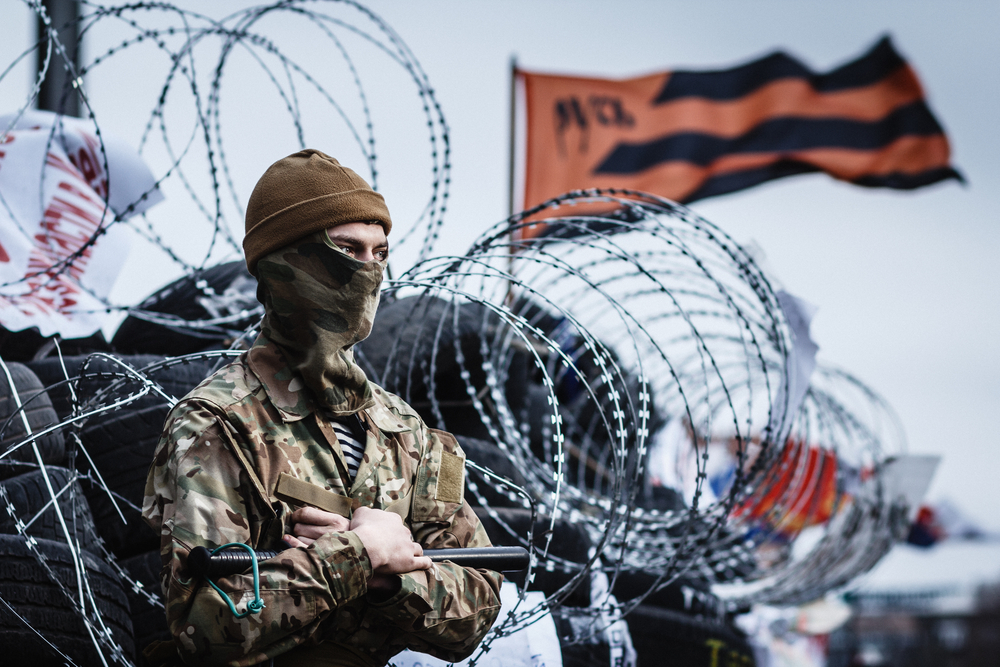
LUHANSK, Ukraine — A convoy of more than 200 white trucks crossed the Russian border to deliver humanitarian aid to a battered Ukrainian city on Saturday, a move made without Kiev’s consent yet met with silence by Ukraine’s top leaders.
“Early in the morning, we entered Ukraine to bring aid to Luhansk,” said Yury Stepanov, a Russian who was overseeing the convoy. “We came in around 215 vehicles,” he added, as workers unloaded boxes into a local warehous.
The much-needed aid arrived as fighting flared again between pro-Russian rebels and government forces, further imperiling an already fragile cease-fire in the region.
On Saturday, Ukraine’s military operation in the east said it had repelled a rebel attack on the government-held airport of Donetsk, which came under artillery fire from rebel positions late on Friday. Ukrainian authorities also admitted for the first time since the cease-fire started last week that they have inflicted casualties on the rebel side.
Continuous rocket fire could be heard overnight in Donetsk. A statement on the city council website said that shells hit residential buildings near the airport, although no casualties were reported. A column of three Grad rocket launchers – all its rockets still in place – was seen moving freely through the rebel-held city on Saturday morning.
In the other regional capital of Luhansk, one of the worst-hit cities where tens of thousands have been without water, electricity, or phone connections for weeks, the streets were calm as Russian drivers unloaded aid packages into local warehouses.
Stepanov said the goods consisted mainly of foodstuffs – rice, sugar, and canned fish and beef – but also included medicine, technical equipment and clothes. The deliveries were in closed boxes, small enough to be easily carried by one person, but rice was seen spilling from a broken bag.
Inside the warehouse, an Associated Press journalist saw water bottles carrying the logo of Russia’s LDPR party, led by virulent nationalist Vladimir Zhirinovsky.
While dozens of local workers unloaded boxes, several carloads of armed militiamen in camouflage arrived to inspect the scene.
Stepanov said his team was responsible only for delivery, and distribution will be handled by local authorities – which for now means the separatist leaders of the self-proclaimed Luhansk People’s Republic.
Gennady Tsepkalo, a senior separatist official, said retirees, hospital patients and schoolchildren would be priorities for aid. He said the food would not be used to feed rebel fighters.
“The militia will feed itself separately. This is for the residents of the Luhansk People’s Republic,” Tsepkalo said.
Luhansk shows deep scars of an unsuccessful, weeks-long shelling campaign by government troops. The government had regained growing swathes of territory from the separatists over several weeks, but a major rebel counteroffensive beginning in late August halted and reversed that trend.
Luhansk itself was at one point almost totally surrounded by government troops. Those forces have since abandoned many of their former positions.
As the Russian trucks drove back along the border toward Ukraine, rebel fighters along the road punched the air and waved in greeting.
At the border point of Izvarine, a line of cars that stretched for several kilometers was filled with refugees who had fled to Russia but briefly returned during the cease-fire to grab all the household items they could.
An August agreement between Russia, Ukraine, and the international Red Cross allowed Moscow to bring aid to the region, as long as all vehicles were inspected by Ukrainian border guards and escorted by the ICRC. After two weeks of waiting at the border for all sides to agree, Russia sent the cargo across the border without Kiev’s consent.
The Organization for Security and Cooperation in Europe’s observer mission to the Russian-Ukrainian border said Saturday that ed220 trucks cross into Ukraine, none of which were inspected by the Ukrainian side or accompanied by the ICRC.
“We were not officially notified of an agreement between Moscow and Kiev to ship the cargo,” Galina Balzamova, a representative of the ICRC’s Moscow office, said Saturday.
The Russian emergency ministry, which coordinated previous humanitarian aid deliveries to Ukraine, could not be reached for comment.
Col. Andriy Lysenko, spokesman for Ukraine’s National Security and Defense Council, told journalists Saturday that Russia’s move into Ukrainian territory was “illegal.”
But the silence of Ukraine’s top leaders marked a dramatic shift in Kiev. In August, when Russia sent a convoy of trucks over the border without waiting for Kiev’s approval or oversight from the ICRC, Ukrainian officials quickly condemned what they called an invasion of Ukraine. On Saturday, no top Ukrainian leader mentioned Russia’s latest delivery at all.
Ukrainian President Petro Poroshenko has been at pains to prove that the cease-fire has yielded improvements on the ground in east Ukraine. On Friday, he lauded the agreement, which has been riddled by violations since it was imposed last week, as a “fragile but efficient peace process.” Allowing more humanitarian aid into the region was one component of the 12-point deal.
—
Mills reported from Kiev, Ukraine. Nataliya Vasilyeva in Moscow contributed reporting.